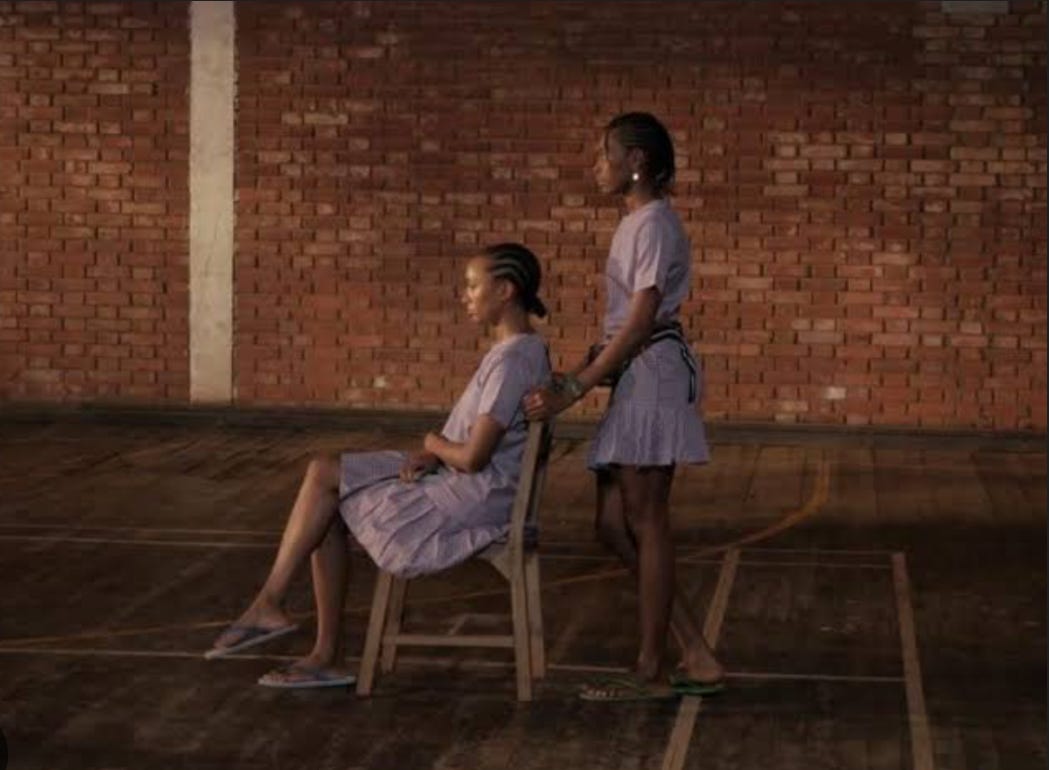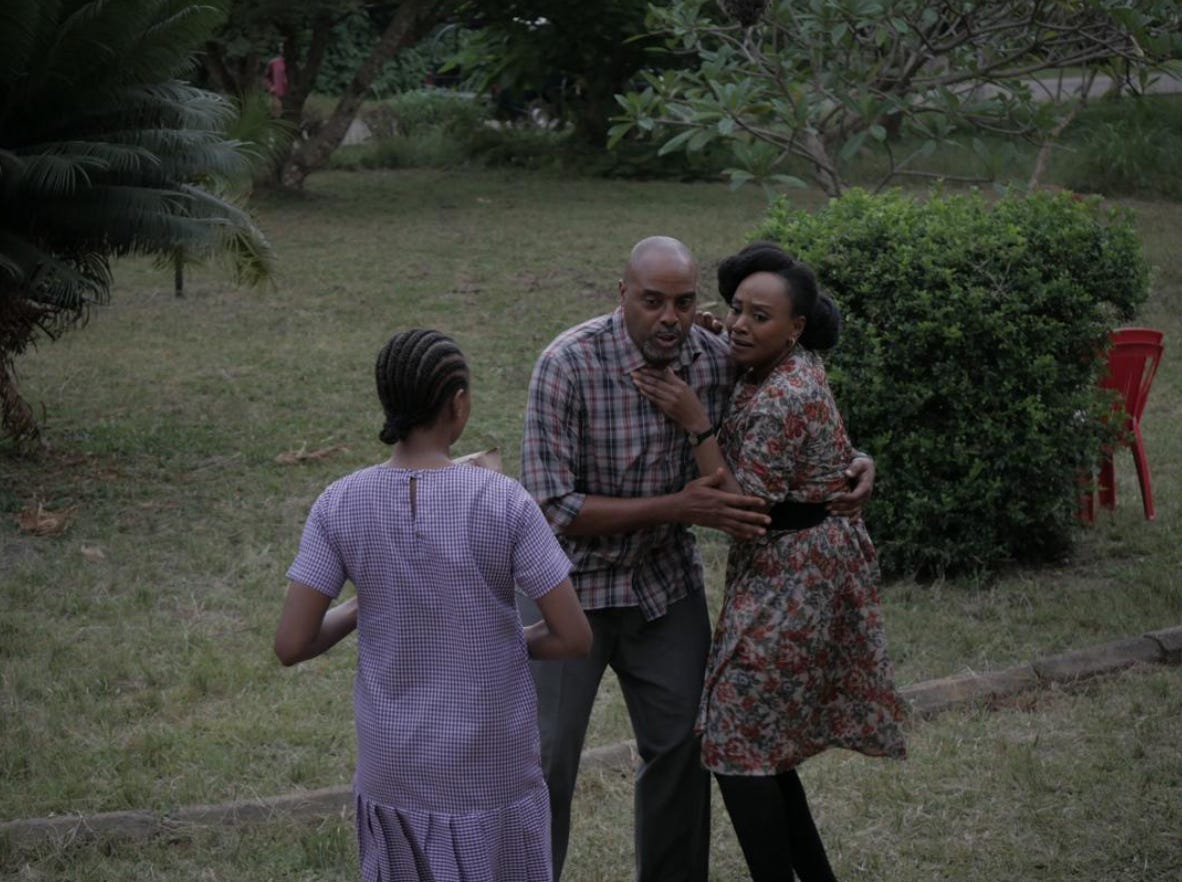There’s a particular kind of excitement that comes from hearing “based on Nigerian boarding school folklore” as the premise for a horror film. You imagine cold dormitory floors, whispered threats about Madam Koi Koi, and torchlight stories that make sleep impossible. You imagine suspense built from silence. Tension that grows in the corners of a corridor. A teacher whose footsteps are just a bit too quiet to be normal. When Ms. Kanyin opened with a stern French teacher and a boarding school in the 90s, it felt like someone had finally decided to make the movie we’d been collectively imagining since JSS2.
Unfortunately, that feeling doesn’t last very long.
Directed by Jerry Ossai, Ms. Kanyin begins with promise. Temi Otedola plays Amara, a hyper-driven student whose greatest ambition is to attend Harvard. But that ambition is derailed by one thing: a C in French. Her teacher, Ms. Kanyin, played by Michelle Dede, is elegant, strict, mysterious, and entirely unbothered by Amara’s academic anxiety. So, in a leap that feels both rushed and under-motivated, Amara and her clique decide to break into the teacher’s chalet and steal the exam paper. There is blood. It touches the roots of a large tree on the school compound. The camera lingers, and suddenly, we are in full-blown supernatural territory. Spirits, curses, exploding bodies. The usual.
The problem is that the film never quite decides what it wants to be. It wants to be horror, yes, but it also wants to be a story about ambition, trauma, revenge, intergenerational silence, and friendship. It wants to be a boarding school nostalgia piece, a spiritual thriller, and sometimes a sports drama. What it ends up being is a film with too many parts that don’t connect and too many ideas that don’t land.
There are moments when Ms. Kanyin looks like it’s going somewhere. The cinematography is often striking, especially in the night scenes. The makeup and costume departments clearly understood the assignment. Gore is used generously, and surprisingly, the effects are decent. There are severed limbs and bloodied school uniforms, but these shocking images arrive before the film has taken time to build tension or explain the stakes. Horror works best when it feels earned. Here, it feels like a performance.
The supernatural elements, when they appear, are not scary so much as confusing. At one point, Ms. Kanyin levitates and manipulates objects with invisible force. At another, a teenage boy nearly stops her with nothing but a door. If her powers follow any rules, we are never told what they are. The story suggests that her spirit is linked to a mysterious tree on the school compound, but that connection is barely developed. We are told it was planted during the founding of the school and that it has something to do with ancestral spirits, but none of it adds up. The myth behind the haunting is treated like a loose sketch rather than the spine of the story.
The film also cannot seem to decide whether Ms. Kanyin is alive, dead, possessed, resurrected, or simply multitasking across the spiritual and physical realms. One moment she is speaking calmly in the staff room. The next, she is flipping a car with her mind. No one reacts like they are in a horror film. Students scream, but they don’t ask real questions. Teachers seem disturbed, but not in the way you would expect after a girl explodes into a puddle of blood on campus.
And that’s part of the larger issue. The reactions don’t match the stakes. It’s like the characters know they are in a horror film, but not a particularly scary one. Which might be accurate.
Even the central character, Ms. Kanyin herself, is never fully explored. The film gives us flashbacks, suggestions of trauma, a hinted past relationship with Mr. Mustapha, played by Ademola Adedoyin, and even a backstory involving sexual assault, but none of it is given time to breathe. For a film named after her, we leave knowing surprisingly little about her. She floats between vengeful spirit, misunderstood victim, and school administrator with stylish shoes, but never settles into a clear role.
And then there are the odd detours. Like Uti, played by Natse Jemide, who is apparently training for a 100-meter swim. In a school pool. With no coach, no competition, and no connection to the rest of the story. It’s played entirely seriously, as if we are meant to find meaning in it. Instead, it just makes you wonder if the film’s left hand knows what the right is doing. Maybe the spirit possessed the script halfway through.
The dialogue is another hurdle. Most conversations sound like the characters are reading scene summaries to each other. “I know you’re worried about Harvard.” “She’s hiding something from her past.” That kind of thing. Temi Otedola, who showed early promise in Citation, feels a bit boxed in here. There’s not much emotional texture for her to work with. Michelle Dede, on the other hand, gives Ms. Kanyin enough quiet power to remain interesting, even when the script doesn’t help her. Kalu Ikeagwu does well with what he’s given. Toluwani George brings some light to her scenes. And Ademola Adedoyin tries very hard to carry emotional weight with limited tools. His accent does wander a little, but so does the plot.
And then the film makes a choice that’s hard to ignore. It includes a sexual assault scene between Ms. Kanyin and a male parent. There is no lead-up. No emotional consequence. It’s simply used to justify her transformation into something vengeful. It is a deeply careless handling of a serious issue, and it makes you wonder if the writers understood how important that moment should have been. The answer, clearly, is no.
On a technical level, the film struggles too. A student’s diary says 2024, but this is a story set in the 90s. Boom mics dip into scenes. These are the kind of details that should not slip through, and when they do, they tell you that the film was rushed or under-directed. Even the editing feels awkward. Transitions are sharp when they should be smooth. Scenes cut before they have landed. It feels like the movie kept running before the script was finished.
That’s the real pity. Because somewhere in Ms. Kanyin, buried under all the distractions and subplots, is a genuinely compelling idea. The setting is rich. The potential for dread is real. Boarding school itself is already a kind of psychological thriller. One where rules are strict, punishment is random, and authority figures are often too powerful to question. Add folklore to that and you don’t even need flying bodies to scare us. A shadow in the corridor is enough.
But Ms. Kanyin wants to do everything at once. It wants to impress you with its visuals, throw in a love story, touch on trauma, add some blood, build a myth, explore schoolgirl loyalty, and give you a spirit tree origin story. In the process, it ends up doing none of it particularly well.
In the end, Ms. Kanyin reflects both the potential and the ongoing challenges of Nollywood horror. The ideas are bold. The visuals are getting sharper. But the storytelling still needs discipline. With more time, a tighter script, and a clearer sense of tone, this could have been a haunting experience. Instead, it leaves you with unanswered questions and the frustrating sense that something important got lost along the way.
Rating: 2 out of 5









Tomi, you’re too good, I watched the film in anticipation and everything you said is absolutely true. Absolutely detailed and accurate
😭 wdym the real horror was the dialogue?